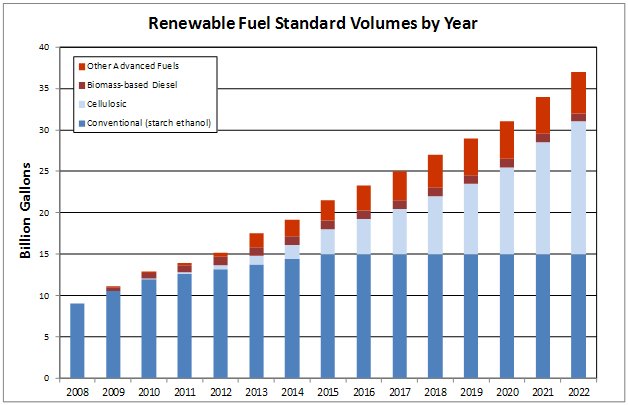New Ethanol Mandate to Breach 10% 'Blend Wall' Satisfies Nobody - Except EPA

Serendipitously, Sajeev Mehta’s post about the possible damage to older cars from gasoline-ethanol blends went up just a few days after the U.S. Environmental Protection Agency proposed a new mandate to mix another 700 million gallons of biofuels — including 300 million gallons of corn-based ethanol — into the country’s fuel supply.
The objective of the new mandate: hit a 18.8 billion gallon 2017 target for biofuels.
The move has both critics and supporters of ethanol unhappy.
Corn farmers and ethanol producers* point to the fact that the new 2017 target is still short of what Congress stipulated in a 2007 amendment to the 2005 Renewable Fuels Standard (RFS).
The EPA used its authority, written into that law, to temporarily waive the standard.
The Renewable Fuels Association said in a statement, “For months, EPA has been saying it plans to put the program ‘back on track.’ Today’s proposal fails to do that. The agency continues to cater to the oil industry by relying upon an illegal interpretation of its waiver authority and concern over a blend wall that the oil industry itself is creating.”
For its part, the oil industry isn’t pleased either. Critics of ethanol as a fuel say the RFS predates the significant increases in oil and natural gas production due to horizontal drilling and fracking, and that the standard is simply no longer needed because of abundant fossil fuel supplies.
The American Petroleum Institute said, “Consumers’ interest should come ahead of ethanol interests. EPA is pushing consumers to use high ethanol blends they don’t want and that are not compatible with most cars on the road today. The administration is potentially putting the safety of American consumers, their vehicles and our economy at risk.”
Chet Thompson, president of the American Fuel & Petrochemicals Manufacturers, issued a statement saying, “While we support the Environmental Protection Agency’s (EPA) continuing use of its statutory waiver authority to reduce the unrealistic mandated biofuel volumes for 2017, the proposed volumes still go beyond marketplace realities. EPA’s proposal threatens to force consumers to use more biofuel than vehicles, engines and fueling infrastructure can handle.”
Those claims about putting our vehicles at risk and blending more biofuel than vehicles can handle is based on the so-called “blend wall” of 10 percent that critics say will damage car engines. Isaac Orr, of the Heartland Institute, a free-market think tank, says the biofuel percentage will rise to 10.44 percent under the new rules.
As Sajeev pointed out, however, the damage to cars from current ethanol blends appears to be tolerably minimal, and not worth the additional cost of higher octane fuels that aren’t blended with alcohol. I’m not sure that a fraction of a percent is going to make a big difference with the automotive fleet, much of which is flexfuel capable, but there are millions of gasoline engines that could be more negatively affected. Small gasoline engines that power lawn mowers, gardening equipment, and snow blowers, as well as the motors that run small boats and snowmobiles, are less tolerant of ethanol. Some owners blowers and weed whackers are used to the idea of those machines being disposable, only good for a year or two if fueled by ethanol blended fuel.
My working headline for this post originally ended “New Rule Satisfies Nobody,” but that’s not entirely true. The acting assistant administrator for the EPA’s Office of Air and Radiation, Janet McCabe, said that, “This administration is committed to keeping the RFS program on track, spurring continued growth in biofuel production and use, and achieving the climate and energy independence benefits that Congress envisioned from this program.” McCabe called the RFS a “success story,” pointing to the U.S. as the largest producer of biofuels in the world.
Under federal rule-making legislation, the EPA is accepting comments on the proposed changes until July 11. A public hearing on the increased biofuels mandate will be held in Kansas City on June 9.
* One exception is Koch Industries, the fifth largest producer of ethanol in the U.S. The Koch brothers oppose the ethanol mandate and renewable fuel subsidies on libertarian grounds.
Ronnie Schreiber edits Cars In Depth, a realistic perspective on cars & car culture and the original 3D car site. If you found this post worthwhile, you can get a parallax view at Cars In Depth. Thanks for reading – RJS

Ronnie Schreiber edits Cars In Depth, the original 3D car site.
More by Ronnie Schreiber
Latest Car Reviews
Read moreLatest Product Reviews
Read moreRecent Comments
- SCE to AUX "...to help bolster job growth and the local economy"An easy win for the politicians - the details won't matter.
- Kjhkjlhkjhkljh kljhjkhjklhkjh so now we will PAY them your tax money to build crappy cars in the states ..
- SCE to AUX Yes, I'll miss it, and it doesn't make sense to kill off your 3rd-best seller. 2023 was its best year since 2018.
- SCE to AUX This was the same car I had (05 xB, stick, "camouflage" color) for 7 years - great car.We called ours "The Lunchbox". I added aftermarket wheels, and the 3rd-party cruise control the dealers could install.It suffered only two failures: bad window switch in week 2 (dealer fixed in 1 hour), bad trailing O2 sensor (fixed myself for $70). Fuel economy was always 28-34 mpg.It was a potential death trap, and ride quality became unbearable after 2 hours. I once did a 10-hour round trip in it and could barely walk after.Traded it for a 2012 Leaf, which was a better car in some ways.
- Bd2 The "e" nomenclature signifies the e-ATPs which BMW is pursuing.



































Comments
Join the conversation
i just wish I had a choice.... My cars don't care, but I'd like to buy real gas for my jetski...I've rebuilt the carbs twice. The closest real gas to me is over 150 miles away. What was a good idea at the time is now corporate welfare for Big Ag.
A cash cow for companies like ADM , and a political snowjob by self interested politians like Chuck Grassley. Ethanol blends have done no real good and have indeed proved harmful as well as useless. Yet another case of money influence screwing the public good.